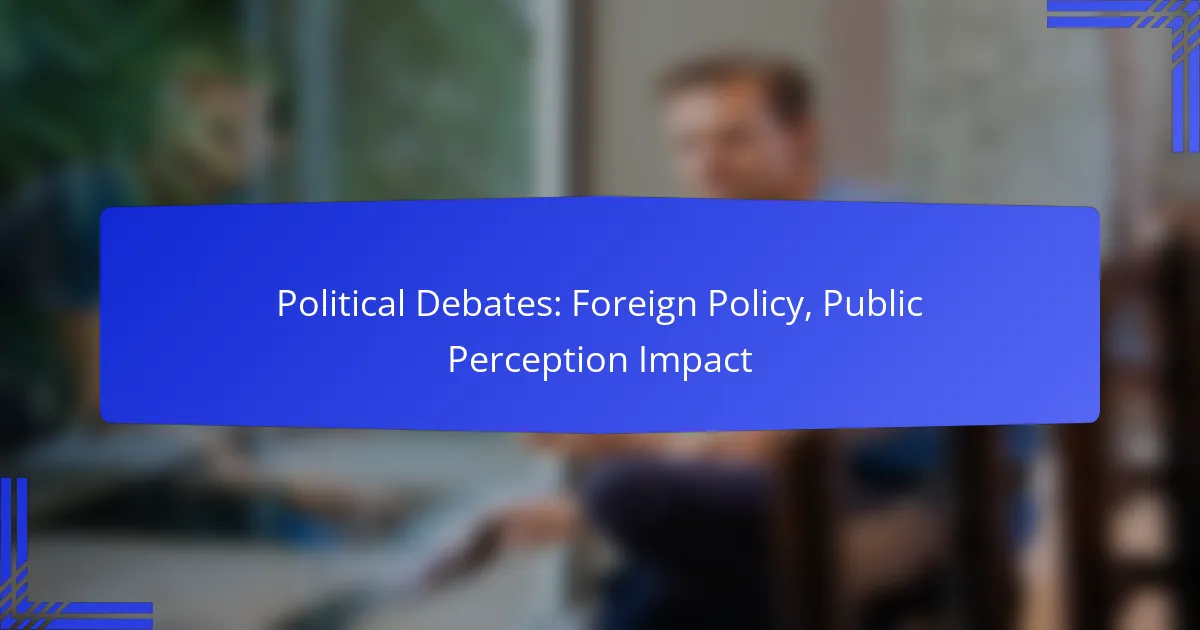Political debates play a crucial role in shaping public perception of foreign policy by presenting candidates’ positions and strategies to the electorate. The way these issues are framed, along with factors such as candidate charisma and debate format, significantly influences how voters interpret international relations and national security. As political parties showcase their distinct approaches, the impact on voter attitudes and public perception becomes increasingly evident.
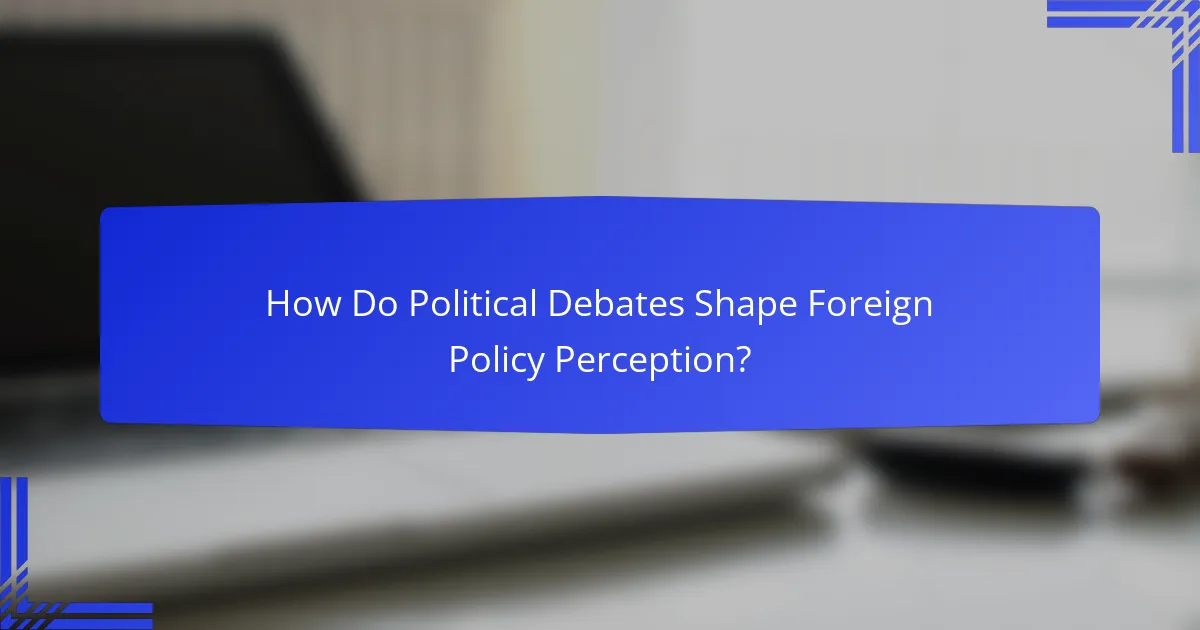
How Do Political Debates Shape Foreign Policy Perception?
Political debates significantly influence public perception of foreign policy by framing issues, highlighting candidates’ positions, and shaping voter attitudes. These debates serve as a platform for candidates to communicate their foreign policy strategies, which can alter how voters view international relations and national security.
Influence on voter opinions
Debates can shift voter opinions by presenting contrasting views on foreign policy. When candidates articulate their positions clearly, they can sway undecided voters or reinforce existing beliefs among their supporters. For instance, a candidate’s strong stance on a particular international conflict may resonate with voters concerned about national security.
Polling data often shows that voters’ perceptions of foreign policy can change dramatically after a debate, especially if a candidate effectively addresses key issues like trade, military intervention, or diplomatic relations. Engaging rhetoric and persuasive arguments can lead to increased support or opposition based on how voters interpret the candidates’ messages.
Impact on policy decisions
Political debates can indirectly influence policy decisions by shaping the priorities of elected officials. When candidates highlight specific foreign policy issues during debates, these topics often become focal points for future legislation or executive actions. For example, if a debate emphasizes climate change as a foreign policy issue, it may prompt policymakers to prioritize international environmental agreements.
Moreover, candidates may adjust their foreign policy proposals in response to public feedback received during debates. This responsiveness can lead to a more dynamic political landscape where voter concerns are reflected in policy-making processes.
Media portrayal effects
The media plays a crucial role in shaping the narrative around foreign policy as presented in debates. Coverage of candidates’ performances can amplify certain messages, influencing public perception of their competence and credibility on international issues. Positive or negative media portrayals can significantly impact how voters perceive candidates’ foreign policy stances.
Additionally, the framing of debates by the media can affect which foreign policy topics gain traction. For example, if the media focuses on a candidate’s comments about military intervention, it may lead to heightened public interest and debate on that topic, potentially swaying opinions and influencing voter behavior.
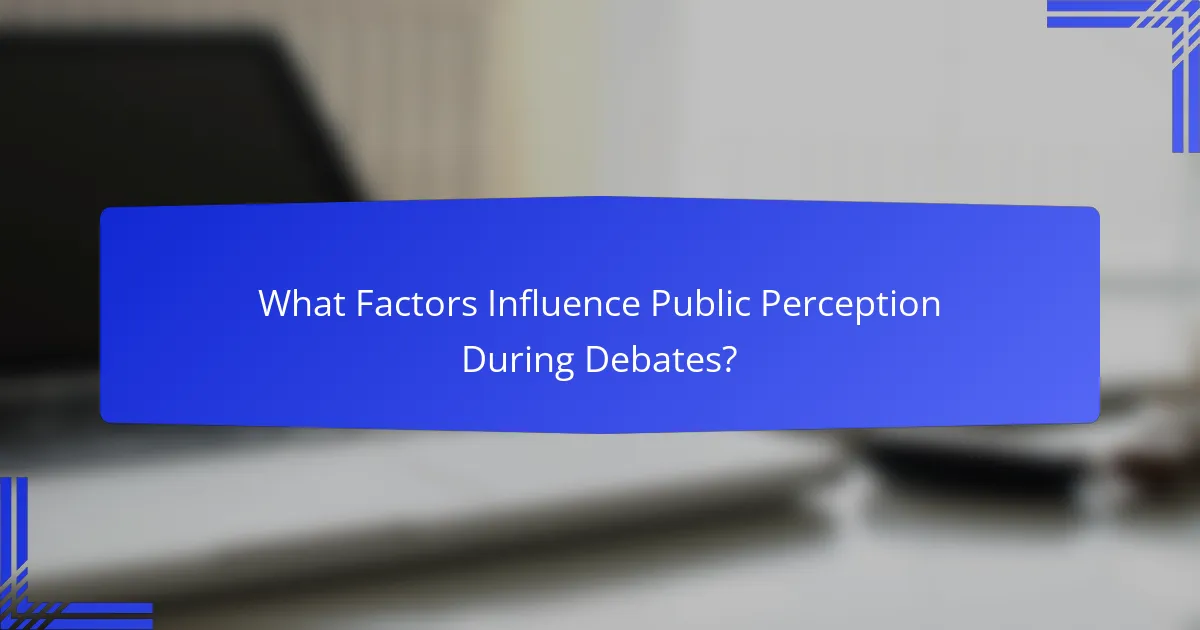
What Factors Influence Public Perception During Debates?
Public perception during political debates is shaped by several key factors, including candidate charisma, the accuracy of fact-checking, and the format of the debate itself. Each of these elements plays a significant role in how voters interpret candidates’ messages and overall performance.
Candidate charisma
Candidate charisma significantly impacts public perception, as it can enhance a candidate’s appeal and relatability. Charismatic candidates often exude confidence and engage effectively with the audience, making their messages more persuasive. For example, a candidate who connects emotionally with viewers may be remembered more favorably than one who lacks that personal touch.
Voters are likely to respond positively to candidates who display strong body language, maintain eye contact, and use humor appropriately. However, over-reliance on charisma without substantive policy discussion can lead to skepticism about a candidate’s qualifications.
Fact-checking accuracy
The accuracy of fact-checking during debates is crucial for shaping public perception. When candidates make claims, real-time fact-checking can either bolster or undermine their credibility. Viewers often turn to trusted sources for verification, and discrepancies between claims and facts can lead to a loss of trust.
For instance, if a candidate is found to have misrepresented statistics or facts, it can result in a significant backlash, affecting their overall image. Voters appreciate transparency, so candidates should strive to present accurate information and be prepared to address any inaccuracies promptly.
Debate format
The format of a debate can influence how effectively candidates communicate their messages and how the audience perceives them. Formats that allow for direct interaction, such as town hall-style debates, often lead to more engaging discussions and can highlight a candidate’s ability to think on their feet.
Conversely, highly structured formats may limit candidates’ opportunities to showcase their personalities or respond dynamically to opponents. It’s essential for candidates to adapt their strategies based on the debate format to maximize their impact and connect with voters.
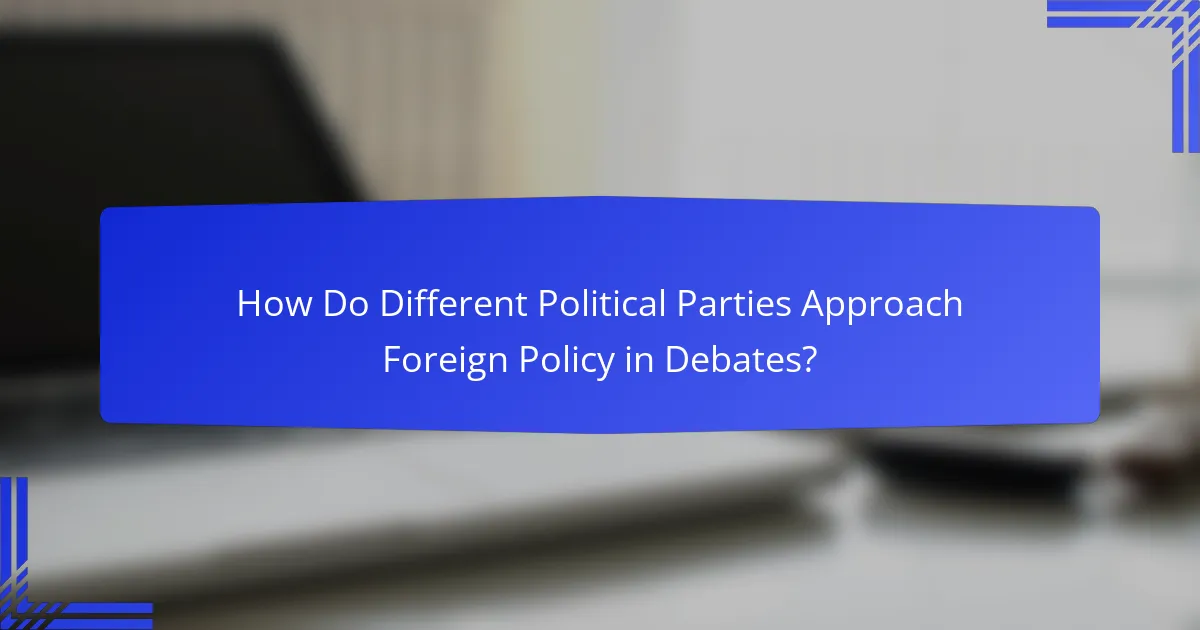
How Do Different Political Parties Approach Foreign Policy in Debates?
Political parties adopt distinct strategies in debates regarding foreign policy, reflecting their core values and voter expectations. These approaches influence public perception and can significantly impact electoral outcomes.
Democratic strategies
Democrats typically emphasize diplomacy, multilateralism, and international cooperation in their foreign policy debates. They often advocate for engaging with global institutions and allies to address issues like climate change, human rights, and trade.
For example, Democrats may highlight the importance of rejoining international agreements, such as the Paris Climate Accord, to showcase their commitment to global collaboration. This strategy aims to appeal to voters who prioritize a proactive and cooperative foreign policy.
Republican strategies
Republicans generally focus on national security, military strength, and a more unilateral approach to foreign policy. They often argue for a robust defense budget and assertive action against perceived threats, emphasizing the need to protect American interests first.
In debates, Republicans might cite examples of military engagements or assertive stances on trade to illustrate their commitment to a strong national defense. This approach resonates with voters who prioritize security and a strong military presence globally.
Third-party perspectives
Third parties often present alternative views on foreign policy, typically advocating for non-interventionism or a focus on domestic issues over international engagements. They may criticize both major parties for their military interventions and call for a reassessment of foreign aid and military spending.
For instance, a third-party candidate might argue for reducing military presence abroad and reallocating those funds to domestic programs, appealing to voters disillusioned with traditional party policies. This perspective can attract those seeking significant change in how the U.S. engages with the world.
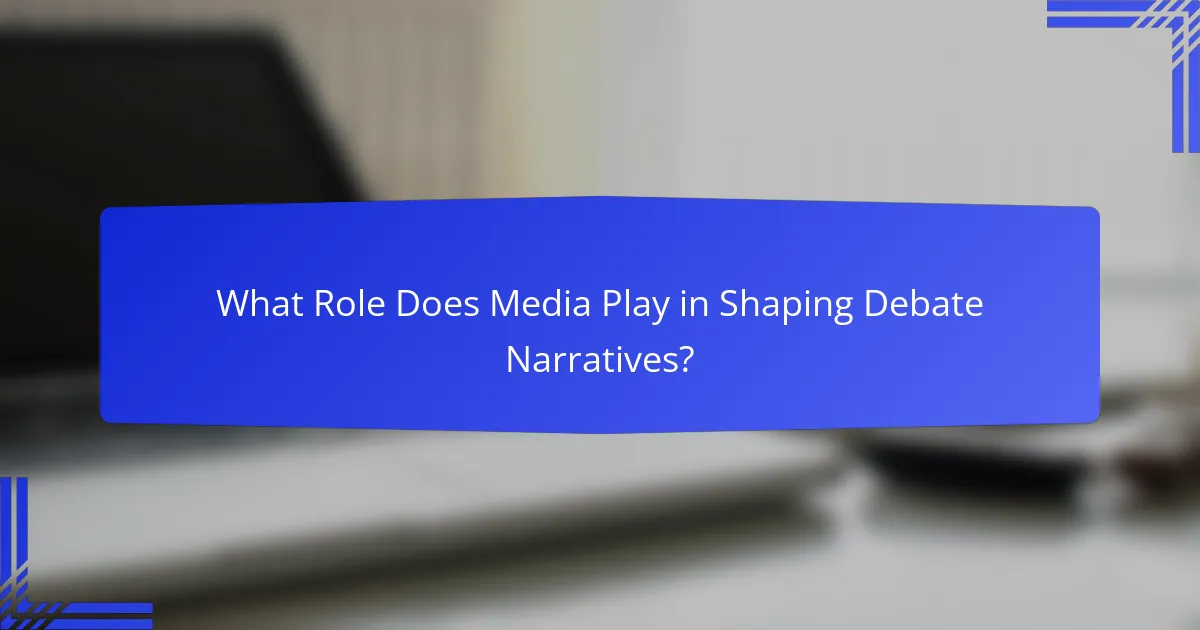
What Role Does Media Play in Shaping Debate Narratives?
Media plays a crucial role in shaping debate narratives by influencing public perception and framing the issues at stake. Through coverage choices, tone, and the platforms used, media can significantly affect how foreign policy debates are understood by the public.
Coverage bias
Coverage bias occurs when media outlets favor certain perspectives or candidates, leading to skewed representations of debates. This can manifest in the selection of topics, the framing of questions, or the emphasis placed on specific responses. For example, if a news outlet consistently highlights one candidate’s foreign policy achievements while downplaying another’s, it can shape public opinion in favor of the favored candidate.
To mitigate coverage bias, consumers should seek diverse news sources and be aware of the potential for partiality in reporting. Engaging with multiple viewpoints can provide a more balanced understanding of the issues at hand.
Social media influence
Social media significantly influences debate narratives by allowing for real-time reactions and discussions among the public. Platforms like Twitter and Facebook enable users to share opinions, which can amplify certain messages and create echo chambers. This rapid dissemination of information can lead to a polarized understanding of foreign policy issues.
To navigate social media’s influence, individuals should critically evaluate the sources of information they encounter and be cautious of viral content that may lack context or accuracy. Engaging in discussions with a variety of perspectives can help counteract the effects of echo chambers.
Fact-checking initiatives
Fact-checking initiatives play a vital role in ensuring the accuracy of claims made during political debates. Organizations dedicated to fact-checking assess statements made by candidates and provide evidence-based evaluations, helping the public discern fact from fiction. This can enhance the quality of discourse around foreign policy by holding candidates accountable for their statements.
To effectively utilize fact-checking resources, voters should familiarize themselves with reputable fact-checking organizations and consult their findings during debates. This practice can empower individuals to make informed decisions based on verified information rather than misinformation.
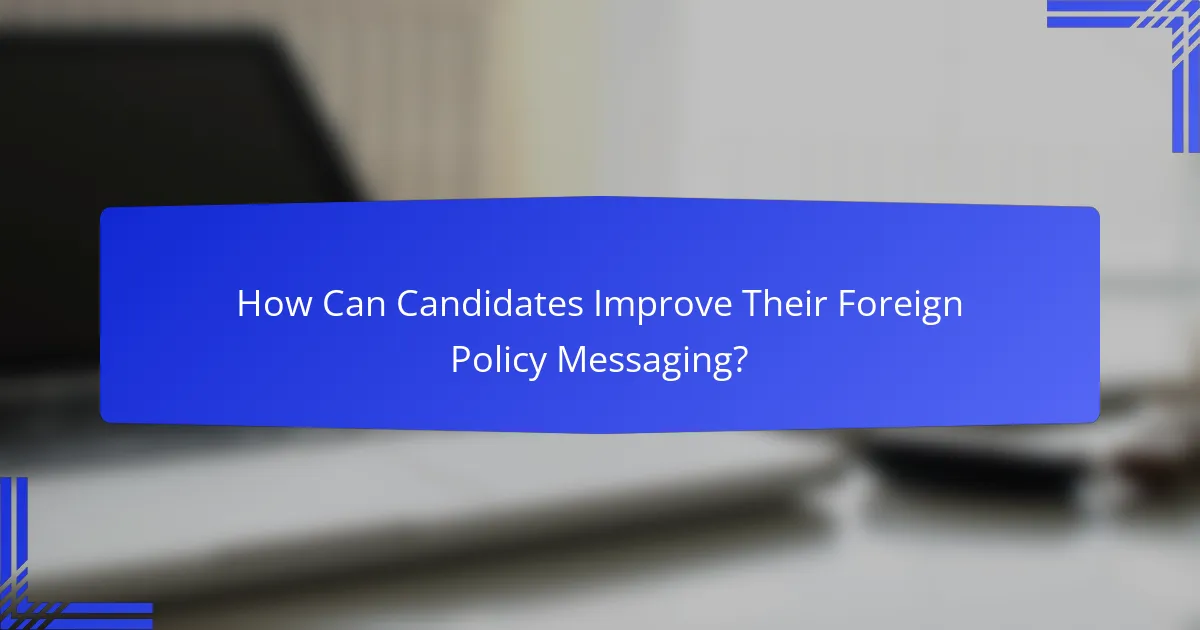
How Can Candidates Improve Their Foreign Policy Messaging?
Candidates can enhance their foreign policy messaging by focusing on clarity, relatability, and addressing public concerns. Effective communication strategies, engaging storytelling, and responsiveness to the electorate’s worries are essential for resonating with voters.
Clear communication strategies
Clear communication is vital for candidates to convey their foreign policy positions effectively. They should use straightforward language and avoid jargon that may confuse the audience. Simplifying complex issues into digestible points can help voters understand their stance.
Utilizing various communication channels, such as social media, town halls, and debates, allows candidates to reach a broader audience. Consistency across these platforms reinforces their message and builds trust.
Engaging storytelling
Engaging storytelling can make foreign policy relatable and memorable. Candidates should share personal anecdotes or historical examples that illustrate their views and the potential impact of their policies. This approach helps humanize abstract concepts and connects with voters on an emotional level.
Using narratives that highlight the consequences of foreign policy decisions can also emphasize their importance. For instance, discussing how trade agreements affect local jobs can make the topic more relevant to everyday voters.
Addressing public concerns
Addressing public concerns is crucial for candidates to build credibility and support. Candidates should actively listen to voters’ worries about international issues, such as security, immigration, and economic impacts. Acknowledging these concerns demonstrates empathy and understanding.
Providing clear solutions or action plans in response to these concerns can further strengthen their messaging. Candidates might consider hosting Q&A sessions or forums to directly engage with constituents and clarify their positions on pressing foreign policy matters.
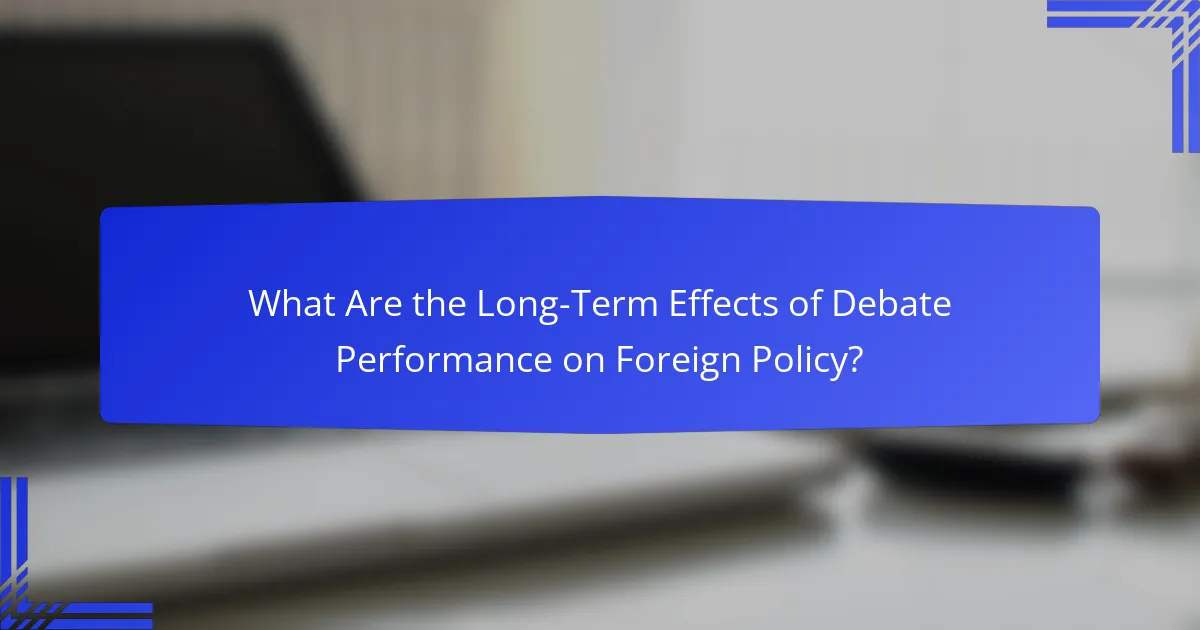
What Are the Long-Term Effects of Debate Performance on Foreign Policy?
Debate performance can significantly influence long-term foreign policy by shaping public perception and altering political priorities. Candidates who effectively communicate their foreign policy vision during debates often see a shift in voter support, which can lead to changes in policy direction once elected.
Shifts in public opinion
Debates serve as a platform for candidates to articulate their foreign policy stances, which can lead to immediate shifts in public opinion. For instance, a candidate who presents a compelling argument for diplomatic engagement may sway undecided voters towards a more interventionist or cooperative approach. Over time, these shifts can solidify into broader public support for specific foreign policy initiatives.
Polling data often reflects these changes, with surveys showing that voters’ preferences can fluctuate significantly following a debate. This responsiveness underscores the importance of debate performance in shaping the narrative around foreign policy issues, such as military intervention or international trade agreements.
Policy changes post-election
Once elected, candidates may feel compelled to align their foreign policy actions with the public sentiment shaped during debates. If a candidate successfully advocates for a particular approach, such as increased military spending or a focus on climate diplomacy, they may implement these policies to fulfill voter expectations. This alignment can lead to substantial shifts in a country’s foreign policy landscape.
Moreover, elected officials often face pressure from their constituents to maintain the positions they articulated during debates. This can result in legislative changes or new initiatives that reflect the priorities discussed, affecting international relations and alliances in the long term.
